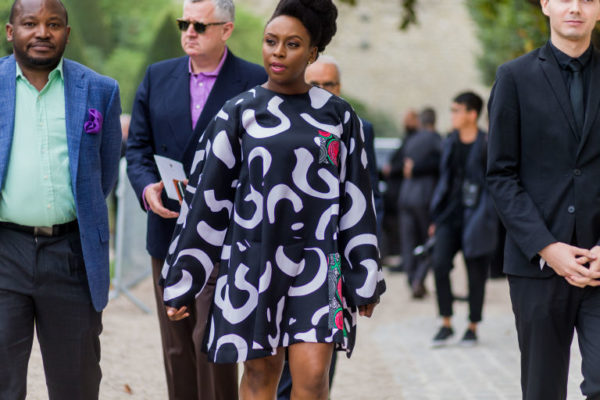
In October, Adichie sat front row at a Christian Dior fashion show in Paris and watched models strutting the run way dressed in t-shirts bearing the inscription, “we should all be feminists.” [read here if you missed it.]
In a recent interview published on elle.com, Adichie takes us back to when Dior first invited her to attend the fashion show and how she declined but later changed her mind when Maria Grazia, Dior’s creative director, sent her a lovely hand-written note.
You’re probably wondering whether she had fun at the show. Aside from finding certain aspects of Fashion Week a bit “baffling,” she had a great time. “Dior showed me the loveliest hospitality, and so, personally, I had a very good time over all,” she says.
She also used the interview to reflect on the question of fashion and feminism, insisting that intellect and stilletoes are not mutually exclusive things.
We’ve selected a few key passages we think you’d like:
On the 2017 Christian Dior collection:
Maria Grazia’s collection was very confident and felt very true, if that makes sense. It was the voice of a woman saying exactly what she wanted to say, and exactly how she wanted to say it, and I admired that enormously. And of course it helped that the clothes themselves were so beautiful; the dresses were ethereal and the jackets had a strong sort of grace—and that WSABF T-shirt wasn’t bad!
On having to choose between writing and fashion:
You don’t have to choose. And you don’t have to try to intellectualize it to make it more acceptable. So no your love of fashion doesn’t have to be a metaphor for the consciousness of multiple metaphysical selves or something. Your love of fashion can just be your love of fashion.
On society’s perception of powerful women who love fashion:
I sometimes wonder whether being ‘open’ about fashion is something women still have to ‘earn.’ That you are still expected to prove your ability first otherwise your appearance will still be used as a proxy for your ability or intelligence. Which is a shame. One of the tragedies of our lives as women is how much we internalize about what a woman should and should not be/do. Sometimes the harsh appearance-based assumptions about women come from other women.
On having her words sampled on the dresses:
I was chuffed, but mostly I was applauding Maria Grazia because ours is a world in which ‘feminist’ is still, sadly, a contested word and idea and she made a courageous and honest stand.
On her awareness of fashion growing up:
Maybe it was also growing up in Nigeria, where dressing-up is generally expected. My mother raised us to think of our appearance as an act of courtesy to others.
Read the full interview HERE.








COMMENTS -
Reader Interactions